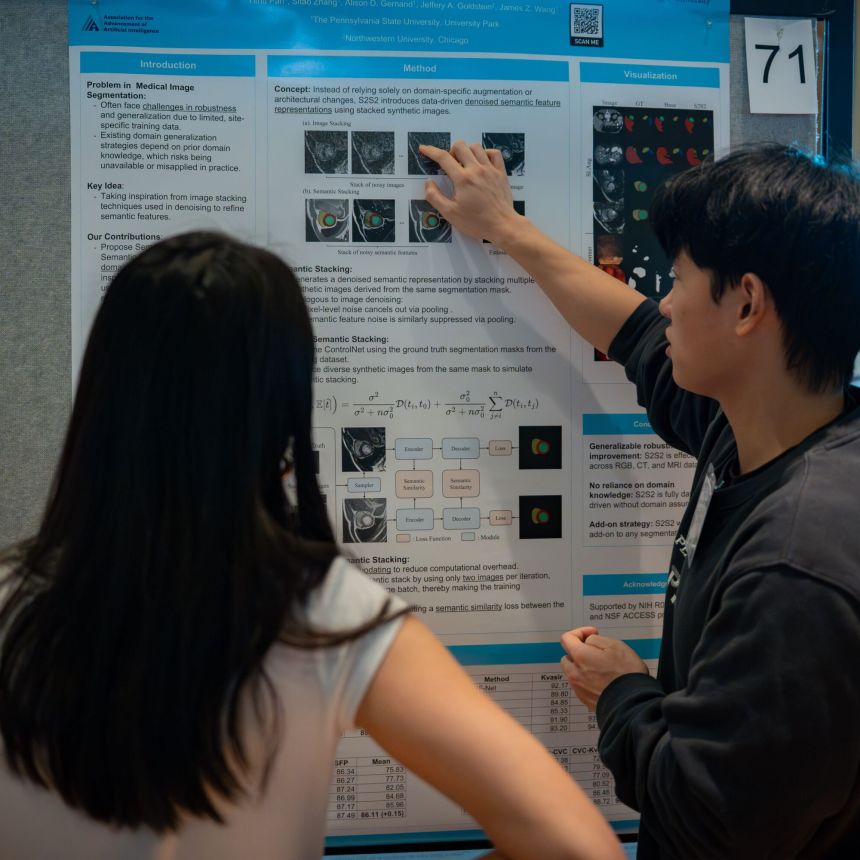
M.S., Informatics
Lead with Information
In the Master of Science in Informatics program, you will engage more deeply in an intellectual conversation with research and science. An M.S. degree typically opens up advanced career opportunities, both in industry and as preparation for a Ph.D.
M.S. Course Requirements
The M.S. in Informatics is a 30-credit degree program, which takes one to two years to complete on a full-time basis. The M.S. in Informatics requires a minimum of 30 credits at the 400, 500, 600, or 800 level, with at least 18 credits at the 500 or 600 series combined; 27 of the 30 credits must be earned at Penn State. Candidates will complete either a thesis or scholarly paper.
Specialty Courses
Within the 30-credit M.S. program, you will complete at least 12 credits of specialty area coursework. A specialty area course could be in IST, law, business, education, engineering, the liberal arts, or any area that is linked to the information sciences. You can take courses from a variety of these subjects, or you can enroll in a series of courses concentrated on one discipline. The College of IST currently offers concentrations in cybersecurity, data sciences, and human-centered design, but note that not all courses are offered every semester.
Program Milestones
In addition to coursework, the M.S. in Informatics program includes several milestones.
-
You will select a graduate faculty member as your adviser and begin working with your adviser by mid-September of your first year.
-
In conjunction with your adviser, you will determine by the end of your first semester if you will complete a thesis or scholarly paper.
-
You will formally select your M.S. degree committee no later than the completion of your first year of study.
-
You will defend your thesis or submit your scholarly paper for approval.
Funding Opportunities
Financial support for M.S. students is not guaranteed. In special circumstances where there are research or teaching support needs, an M.S. student may receive funding in the form of a part-time wage payroll position for up to 20 hours per week. Positions terminate at the conclusion of each semester and carry no guarantee of renewal.
For other financial aid, contact the Office of Student Aid for information on loans and grants or the Office of Graduate Fellowships and Awards for information on internal and external fellowships.
Graduate Research
Our students and faculty are engaged in cutting-edge projects in a variety of research areas, collaborating extensively with scholars within and outside the college on cutting-edge interdisciplinary and trans-disciplinary research.
Our research aims to solve society’s most challenging problems that transcend traditional disciplinary boundaries—from responding to natural disasters to improving human health and well-being, from protecting national security to making sense of big data, from exploring the connections between gender and technology to utilizing GIS for humanitarian efforts.
Their work is done in the college's research centers and labs, which are led by national and international scholars that cover a broad spectrum of research areas. In addition to our own facilities, we maintain relationships with related centers and labs across the Penn State campus and collaborate around the world.
Research Areas

Human-Centered Computing and Social Informatics
Creating and evaluating interactive systems and studying the affective aspects of user experience.

Informatics and Intelligent Systems
Advancing the capacity to model intelligent behavior and harnessing, applying, and integrating the insights of big data to our world.

Privacy and Cybersecurity Informatics
Detecting and removing threats of information misuse, enhancing predictability and trust, and understanding online privacy.

